Vladimir Putin
Vladimir Putin, the leader of Russia, makes a state visit to China as a symbol of the alliances’ solidarity
Published
2 months agoon

Putin, the president of Russia, arrived in Beijing on Thursday for a two-day visit to China, a demonstration of power between authoritarian friends
As Moscow moves forward with a fresh offensive in Ukraine, Russian President Vladimir Putin landed in Beijing on Thursday for a two-day state visit. This visit was intended as a show of solidarity between the authoritarian allies.
As dawn broke, Putin was greeted by an honor guard from the People’s Liberation Army, the armed wing of China’s ruling Communist Party.
His motorcade was escorted into the city by a motorcycle-riding brigade of military police. He is scheduled to meet with top officials, including Xi Jinping, to reiterate their commitment to the “no limits” relationship they signed in 2022—just before Russia began its full-scale invasion of Ukraine.
Since then, as a result of Western sanctions that have restricted its access to a large portion of the global trading system, Russia has grown more economically dependent on China.
Putin stated that the Kremlin is willing to engage in negotiations over the situation in Ukraine in an interview with Chinese media the night before the visit. According to the official Xinhua News Agency, Putin stated, “We are open to a dialogue on Ukraine, but such negotiations must take into account the interests of all countries involved in the conflict, including our own.”
The two-day visit by the Russian Putin coincides with his nation’s soldiers launching an offensive in the Kharkiv region of northeastern Ukraine, which started last week. This is the biggest border incursion since the full-scale invasion started, driving nearly 8,000 people from their homes.
The two-year-old conflict has reached a crucial phase for Ukraine’s exhausted military, which is depending on fresh supplies of anti-aircraft missiles and artillery shells from the United States, in addition to Moscow’s attempts to consolidate its victories in the neighboring Donetsk area.
As said by Putin, “We have never refused to negotiate,” according to Xinhua. “We are looking for a peaceful resolution to this dispute that is all-encompassing, just, and sustainable. Although we are willing to have a conversation on Ukraine, it must consider the interests of all parties to the crisis, including our own.
According to Ukrainian President Volodymyr Zelenskyy, any negotiations must entail the return of Ukraine’s territory, the evacuation of Russian forces, the release of all detainees, the establishment of a court for the aggressors, and security assurances for Ukraine.
China maintains its neutral stance in the crisis, but it has supported Moscow’s accusations that the West drove Russia into attacking Ukraine, even though Putin has publicly stated that his goal is to restore Russia’s historic borders.
Putin has lauded China’s peace proposal for Ukraine, which would allow Moscow to solidify its territorial gains, and blamed the West for the negotiations’ failure in the early stages of the war.
“By abstaining from pursuing vested interests and constant escalation of tensions, Beijing proposes workable and constructive steps to achieve peace, minimizing the negative impact of the conflict on the global economy,” he had stated.
Putin claimed that a 2023 Chinese plan could “lay the groundwork for a political and diplomatic process that would take into account Russia’s security concerns and contribute to achieving a long-term and sustainable peace,” despite the fact that the West and Ukraine rejected it.
“Have a detailed discussion on the entire range of issues related to the comprehensive partnership and strategic cooperation and determine the new directions for further development of cooperation between Russia and China and also have a detailed exchange of opinions on the most acute international and regional issues,” the Kremlin said in a statement about Putin and Chinese President Xi Jinping’s meeting this week.
The visit further China’s and Russia’s efforts to overthrow the Western democratic order led by the United States and replace it with a more authoritarian framework that suppresses political opposition, human rights, and free speech. This month, Putin took power for a fifth time.
Foreign Minister Sergey Lavrov stated that Beijing and Moscow are “objectively interested in maintaining our lead in efforts to establish a more fair and democratic world order” during his speech to the Russian parliament’s upper house on Tuesday.
He stated, “Russia and China are not alone in their efforts to help establish a multipolar global order and reform an international system.”
Lavrov stated that “the Russian president’s forthcoming visit to (China) will strengthen our joint work,” noting that the “duet of Moscow and Beijing plays a major balancing role in global affairs.”
As the conflict has continued into a third year, Moscow has developed closer connections with Beijing, rerouting the majority of its energy exports to China and depending on Chinese businesses to buy sophisticated parts for Russian military sectors in order to evade Western sanctions.
The military alliance between China and Russia has also grown. In recent years, they have conducted a number of cooperative war simulations, which have included long-range bomber patrols over the East China Sea and the Sea of Japan as well as naval exercises. Ground soldiers from China and Russia have also arrived on the other nation’s soil for cooperative training.
China is rapidly developing its own defensive sectors, such as the construction of aircraft carriers and nuclear submarines, while simultaneously being a significant market for the Russian military.
Putin has stated in the past that China has benefited greatly from Russia’s transfer of extremely sensitive military technologies, which have helped to increase China’s defense capabilities. He stated in October 2019 that only the United States and Russia had ground-based radar and satellites necessary to detect ballistic missile launches, and that Russia was assisting China in developing such a system.
You may like
-
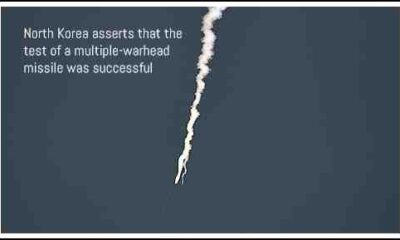

North Korea asserts that the test of a multiple-warhead missile was successful
-
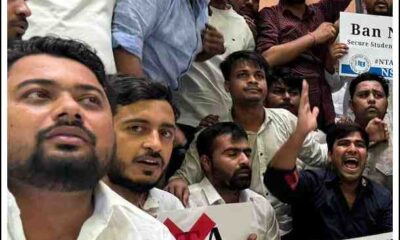

The Student Wing of Congress storms the Exam Body NTA office and locks it from within
-
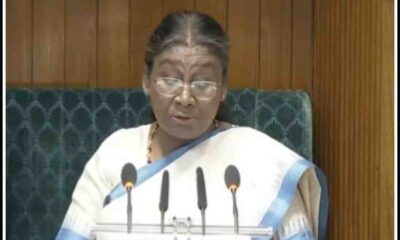

“During President Murmu’s address to Parliament, PM Modi was shown 73 times, and LoP Rahul Gandhi was shown six times”: Congress
-
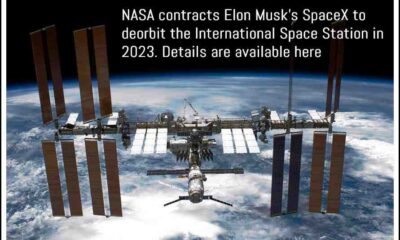

NASA contracts Elon Musk’s SpaceX to deorbit the International Space Station in 2023.
-


A Caution For The CBI In The Delhi Court’s Arvind Kejriwal Custody Order
-
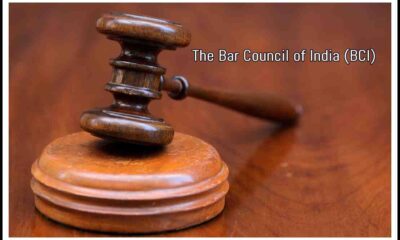

Bar Council of India requests that bar associations abstain from demonstrating in opposition to new criminal laws
